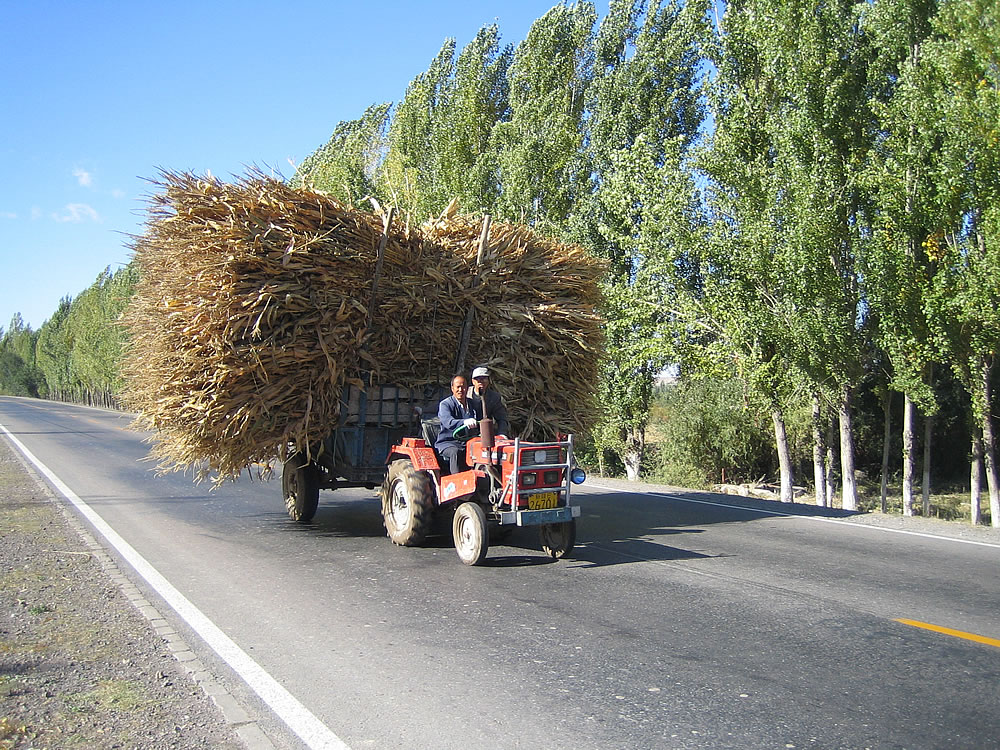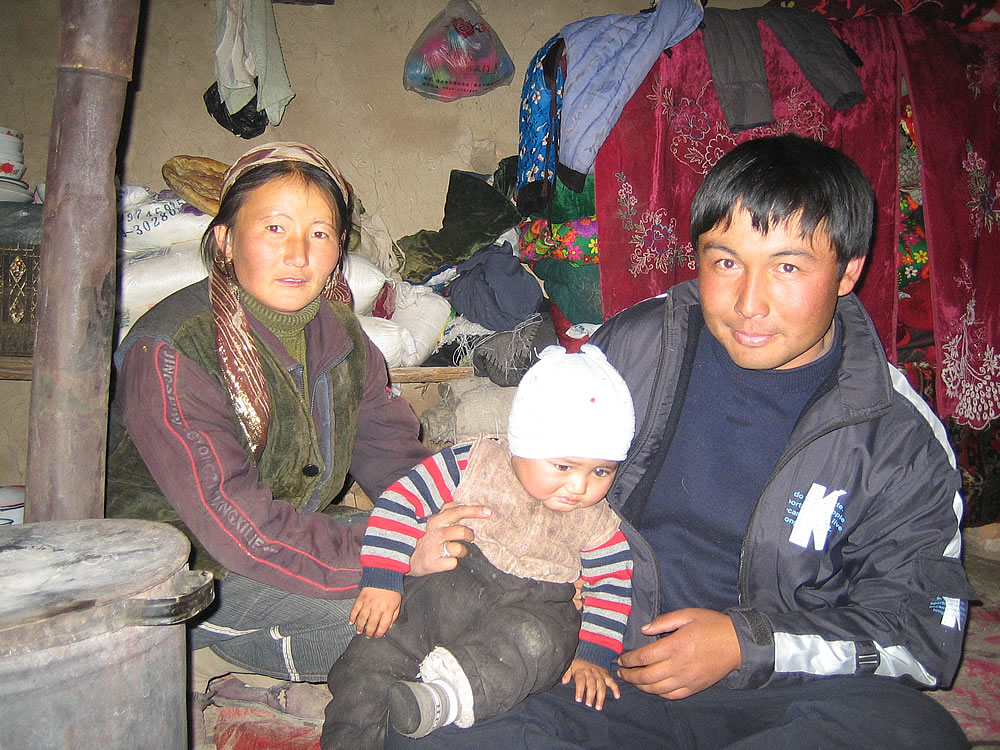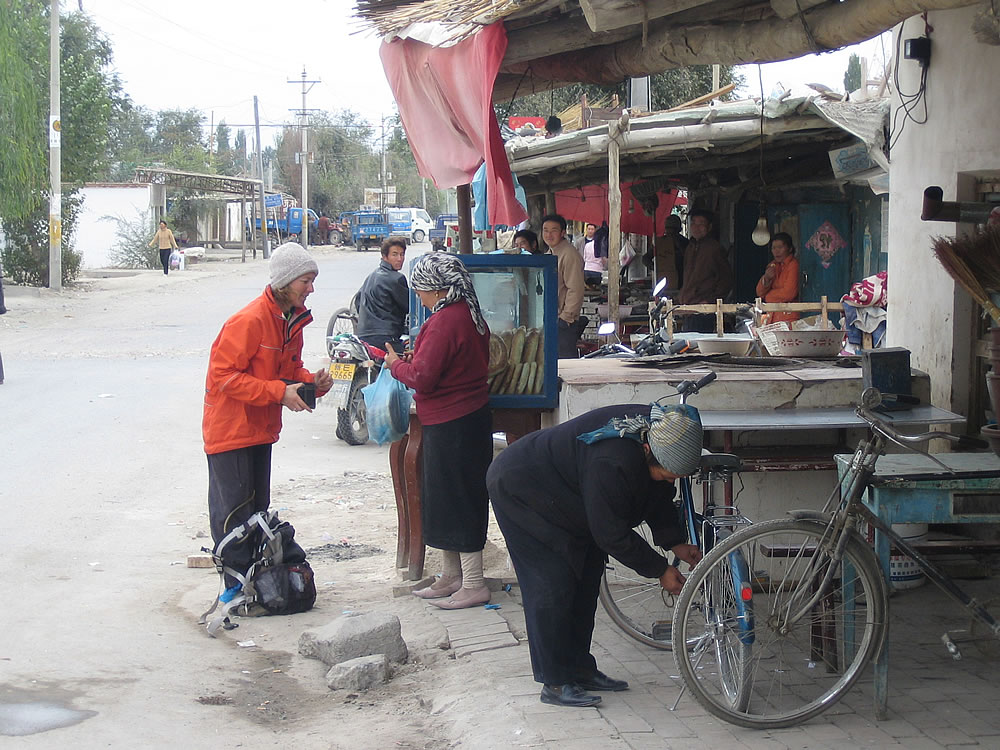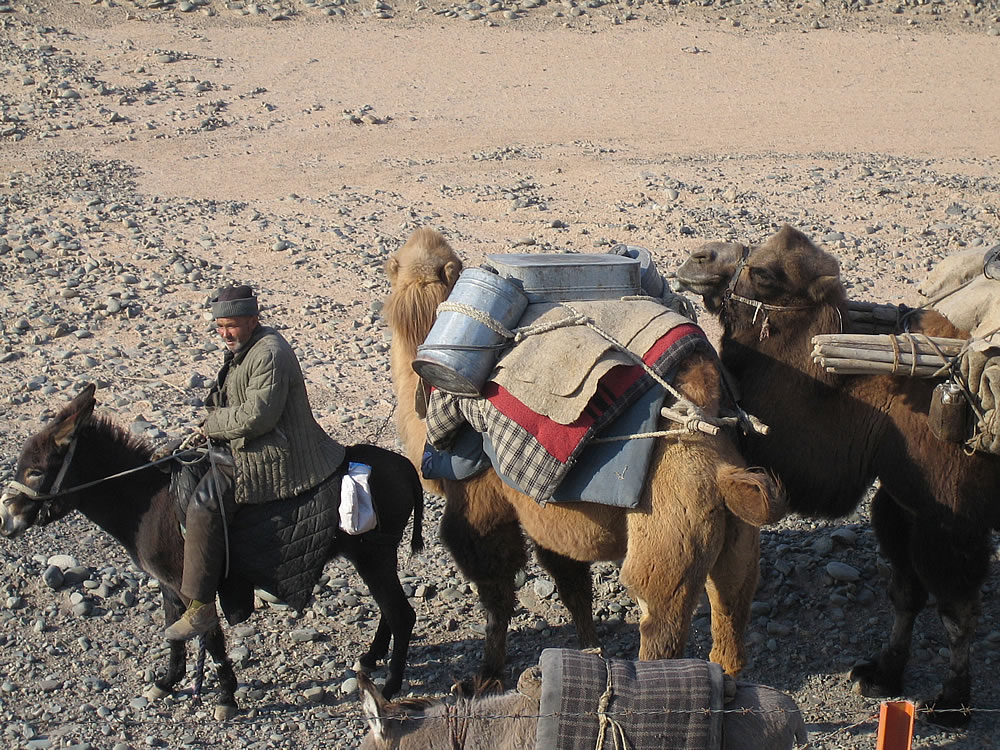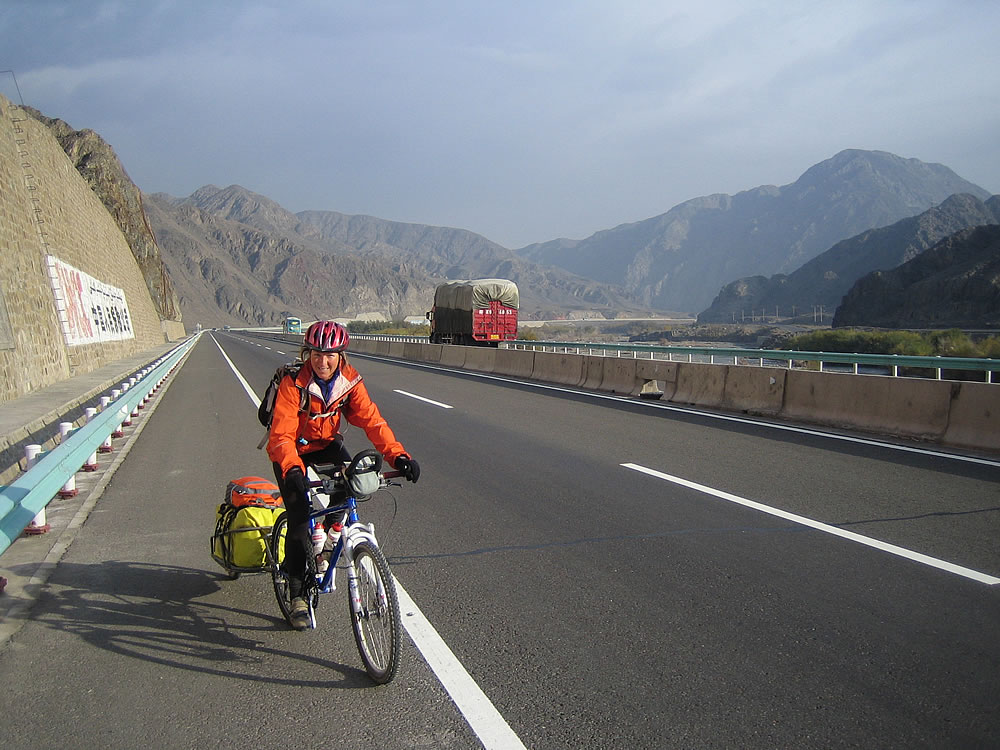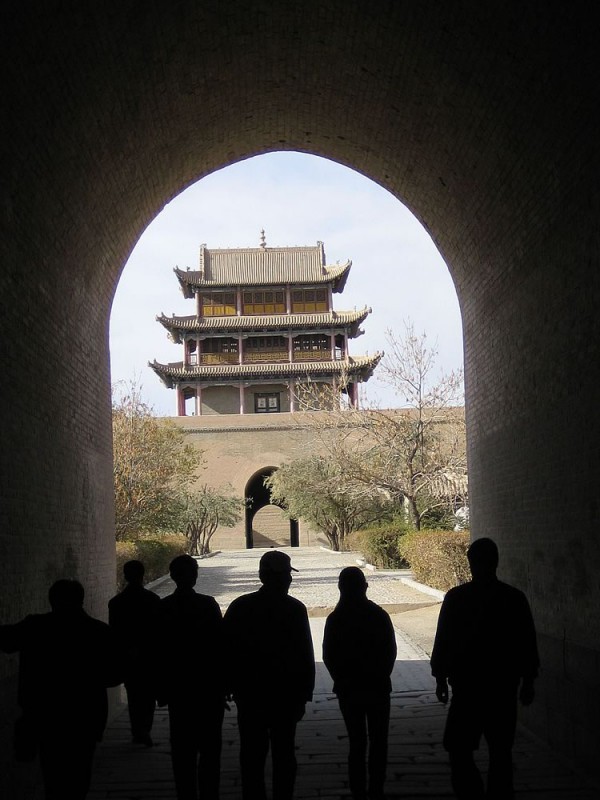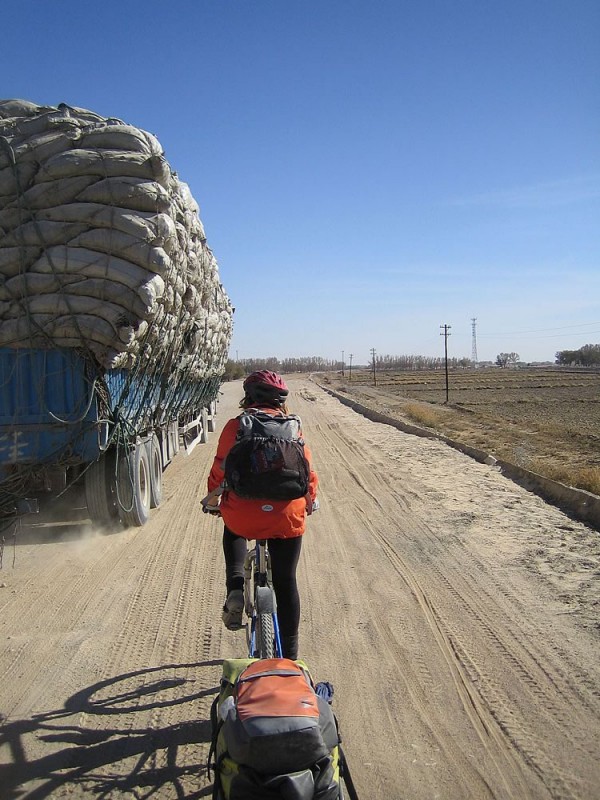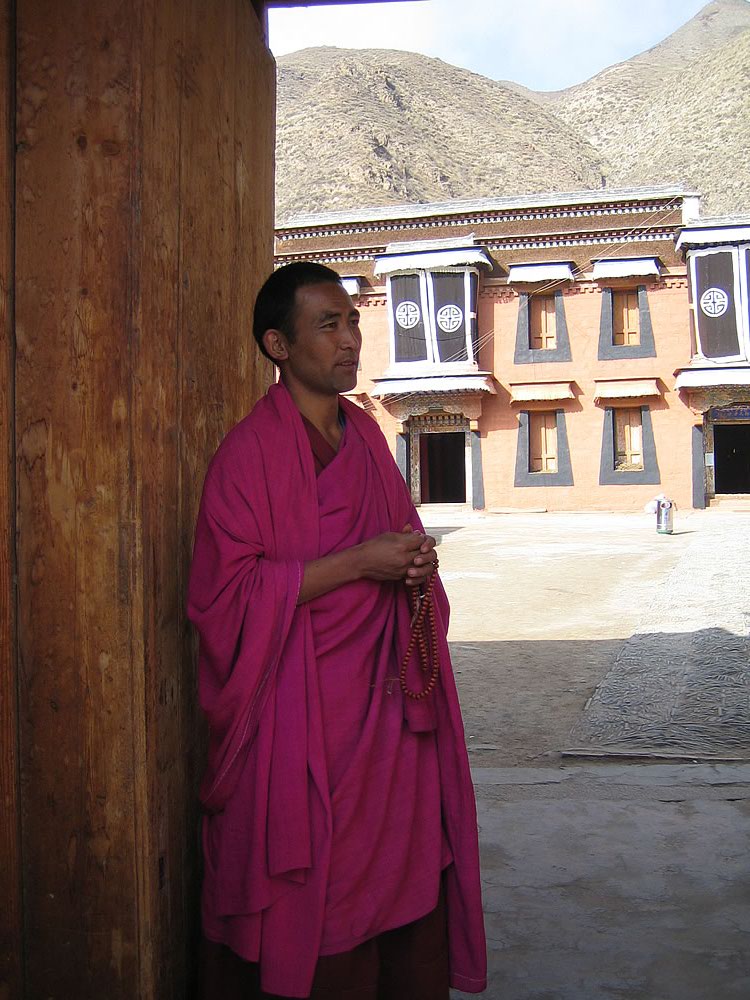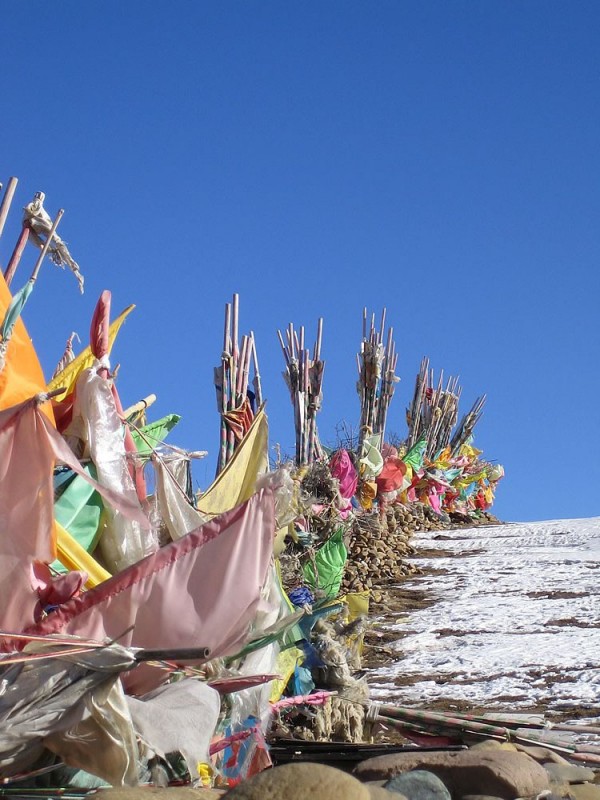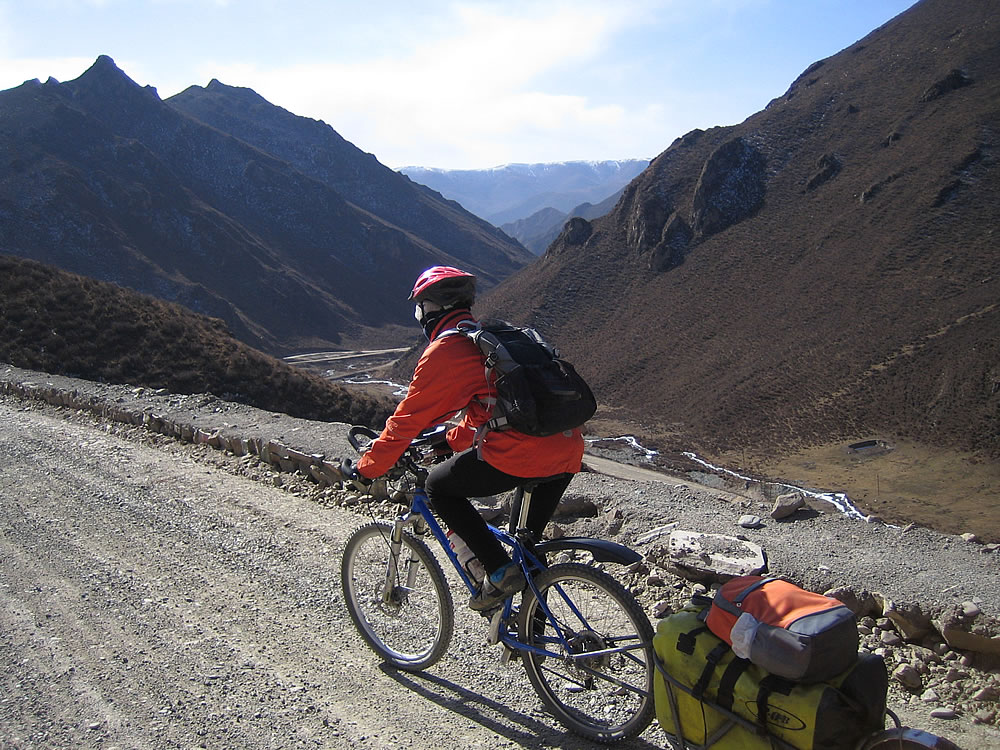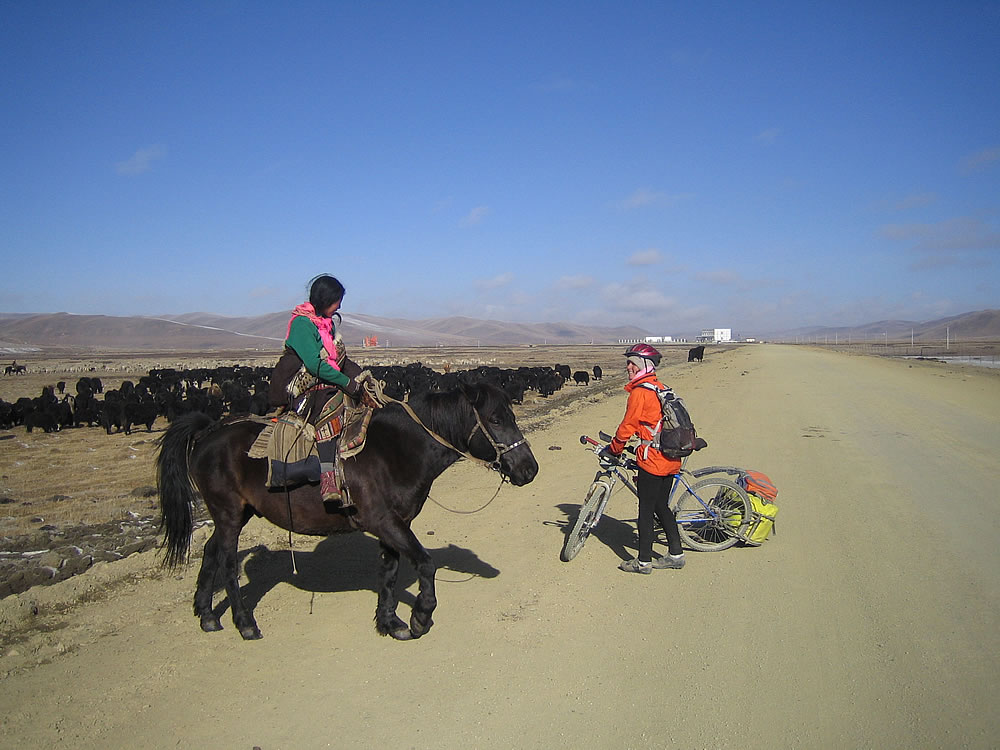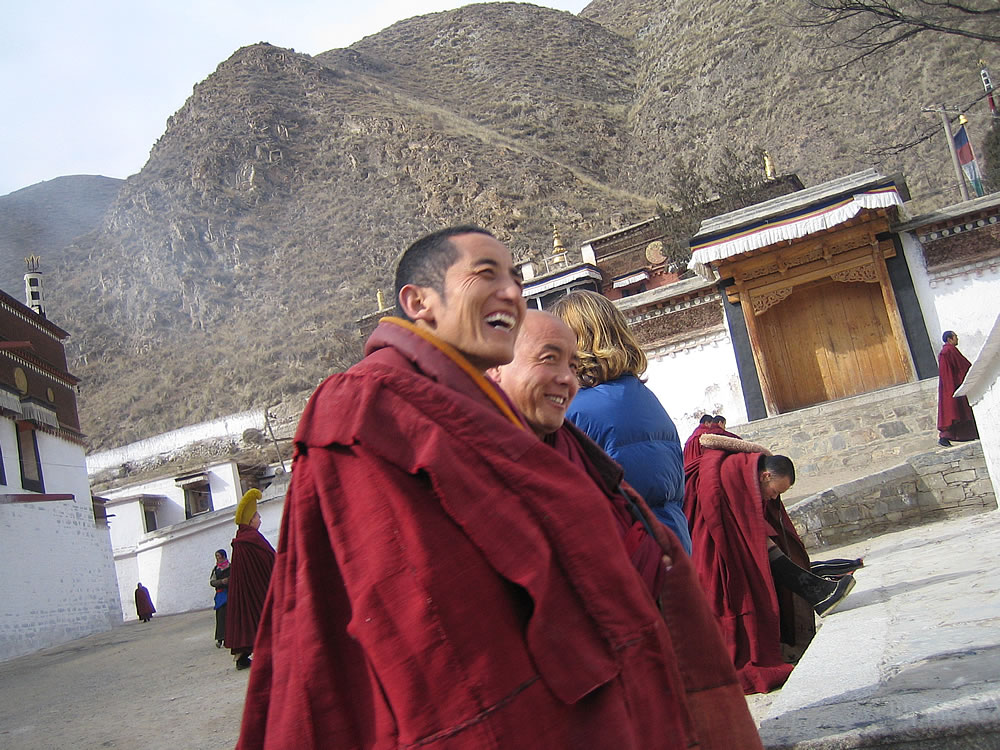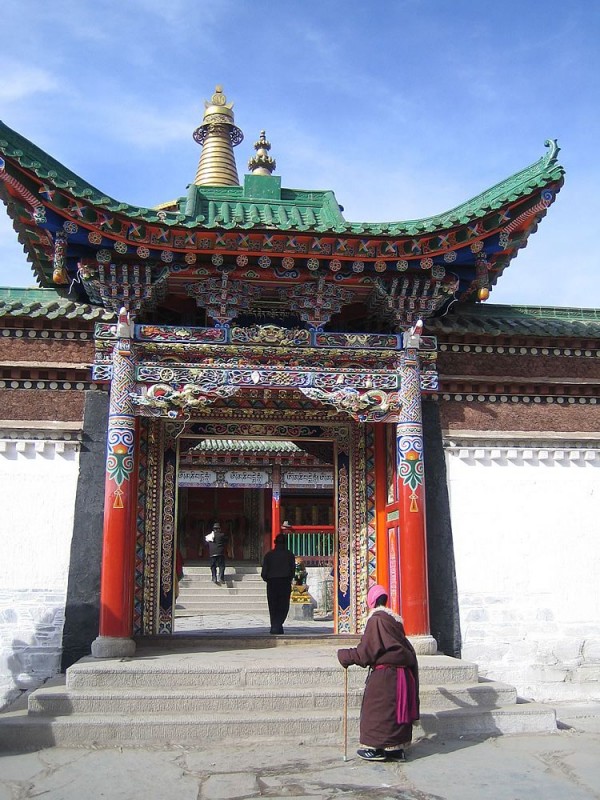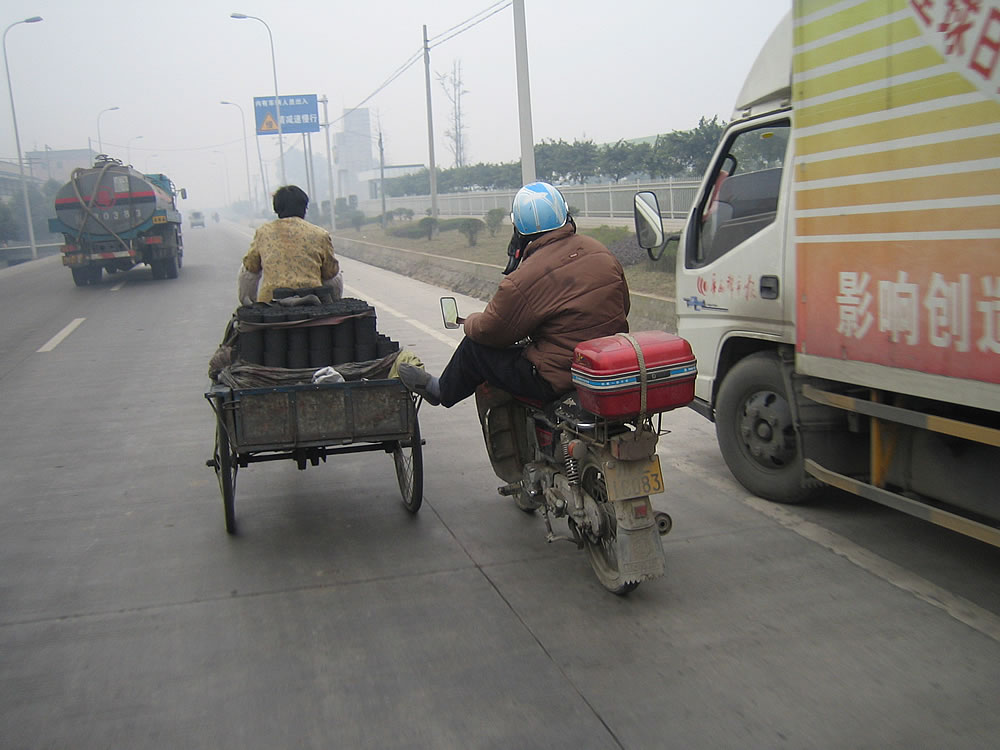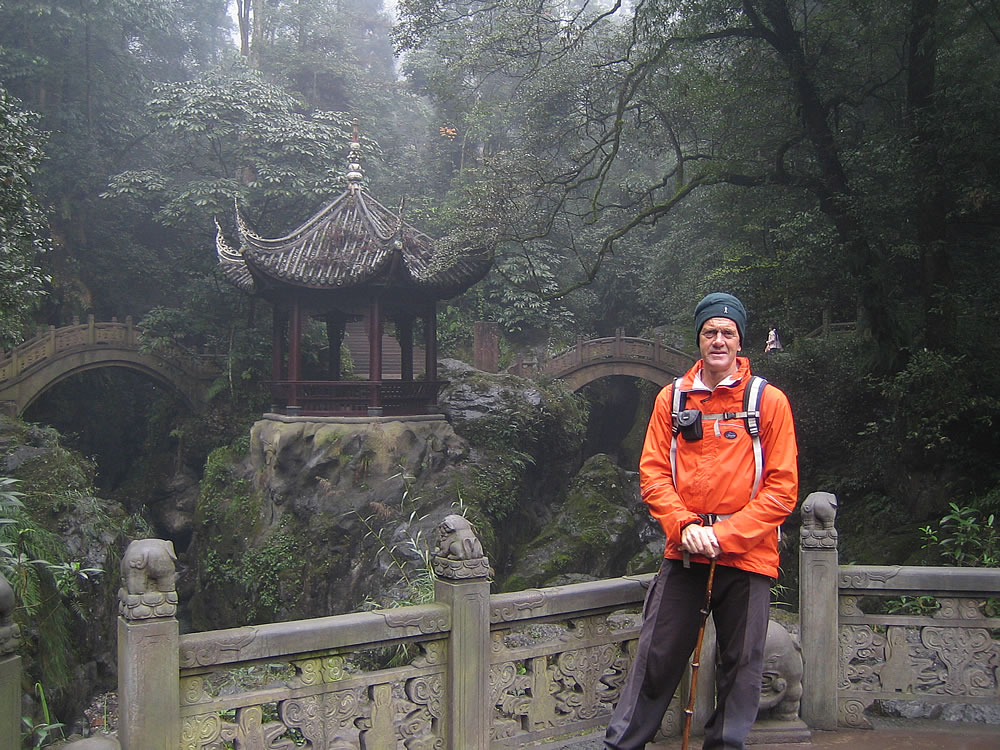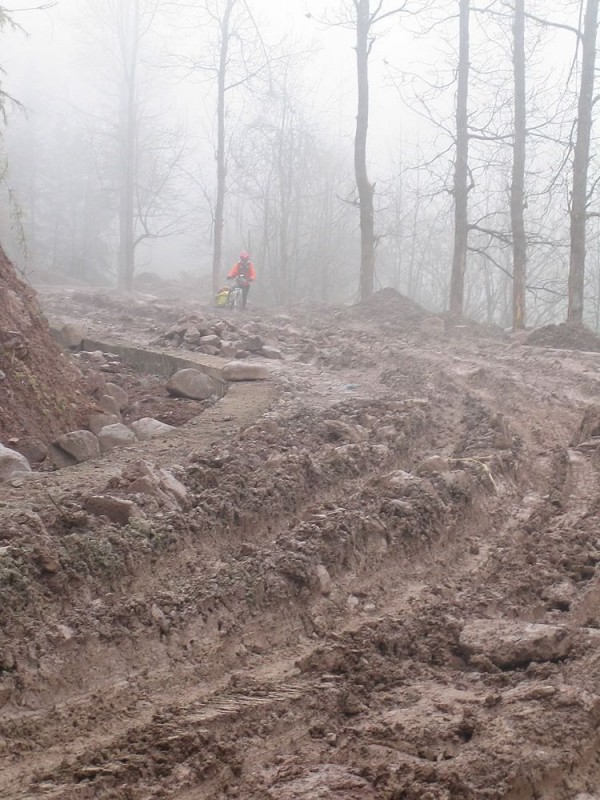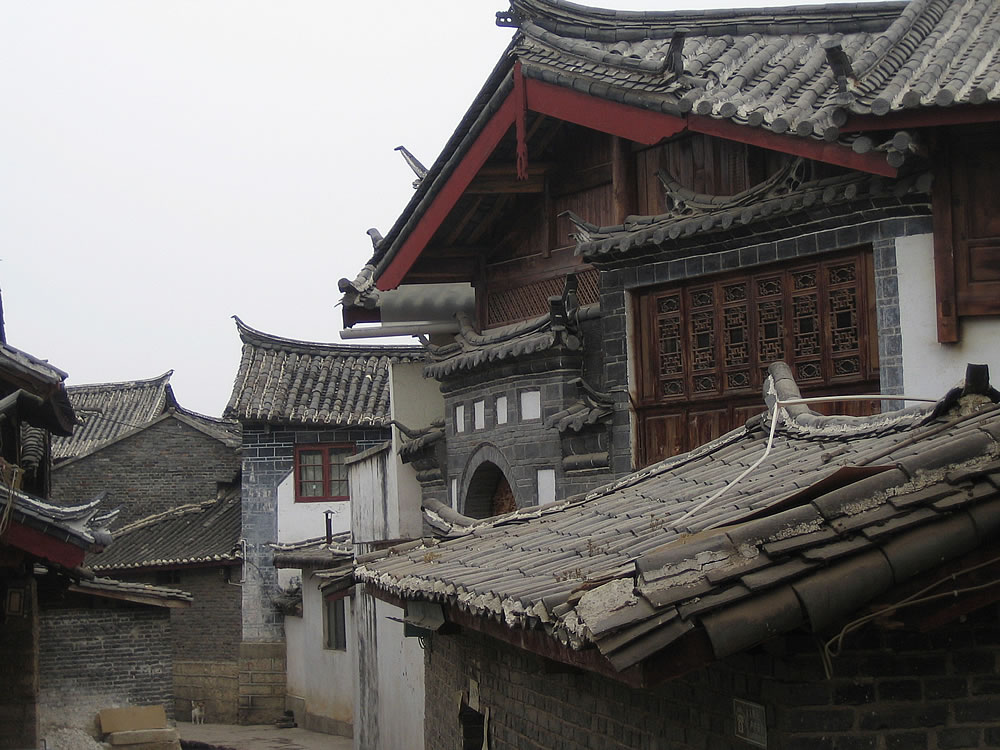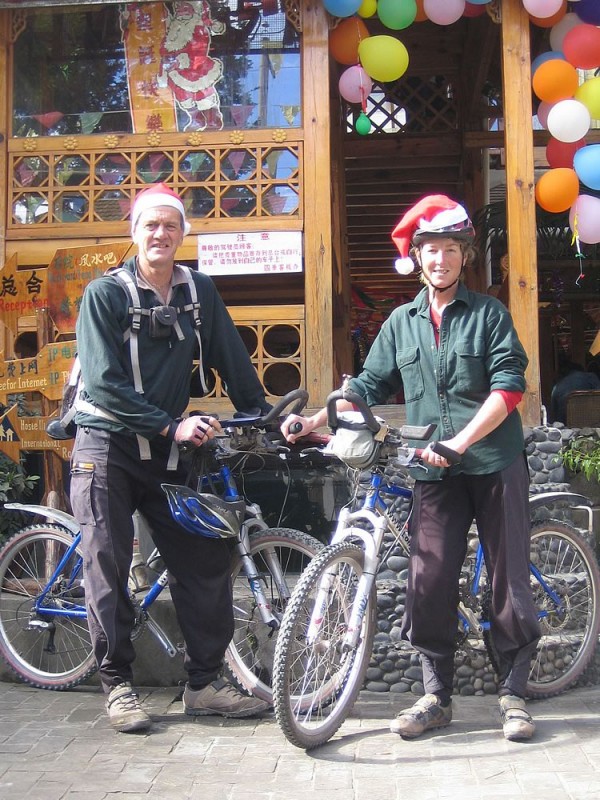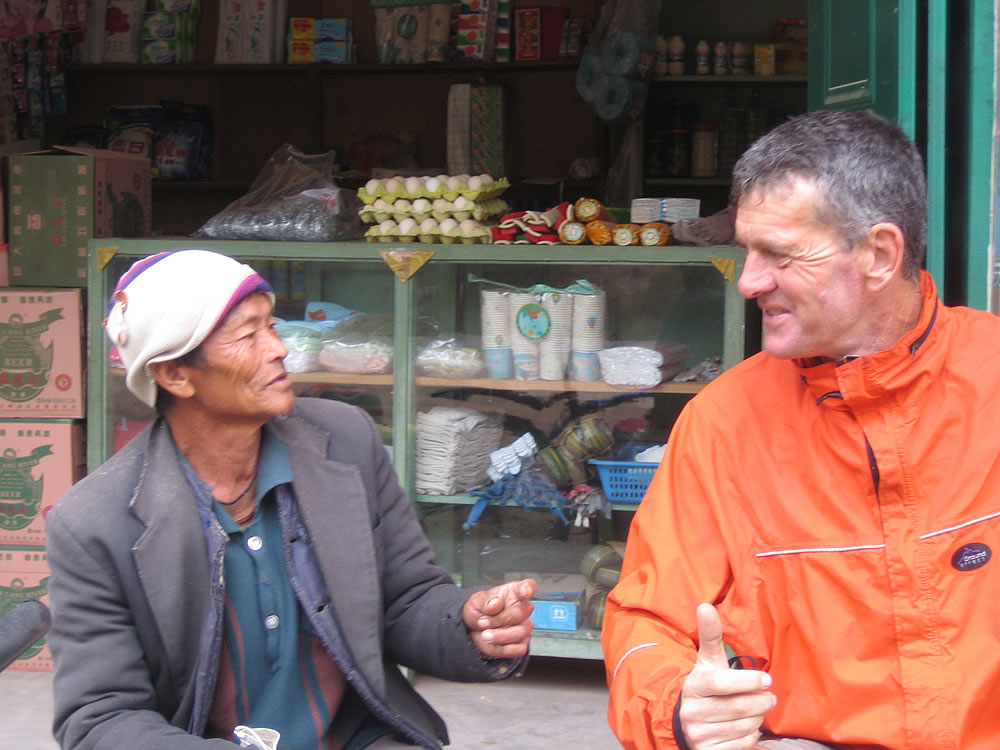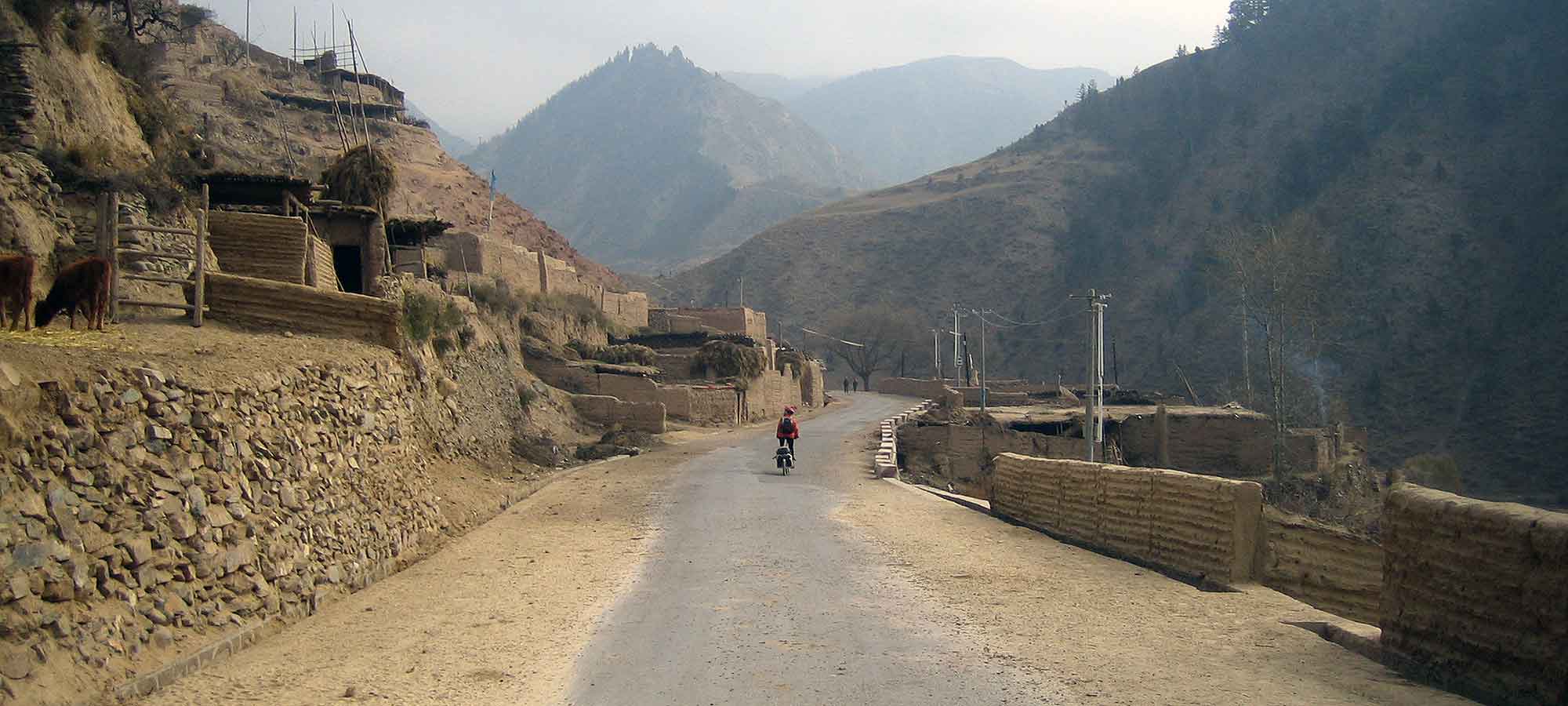
China
Long Way Home
Chapter 13
We were told that we couldn’t cycle the first 20km from the border and would need to take a bus to the next town. But we pedalled serenely away and no-one tried to stop us so we just kept going.
China has been a revelation …. very different to our expectations. The police give us a wave and smile but otherwise leave us alone…. a nice change after constantly being bailed up by the authorities in Central Asia.
Bushcamping in the vast empty deserts of the far flung Western provinces has been a breeze…. we’ve had no problems at all finding secluded spots to camp as we cover some big distances between towns. After seven months we have finally reached the stage of being virtually 100% stareproof. The curiousity hasn’t eased, but it doesn’t seem to bother us much anymore. Walking down the street we are generally oblivious to the entourage following along behind. Until we enter a shop, that is, and turn around to leave, finding the door blocked with the crowd having followed us inside.
Despite strong Western influences on everything from food to fashion, real, live Westerners seem to be a bit of a rarity in this part of China and we can silence a crowded and noisy restaurant just by walking in the door.
After leaving the Chinese border town of Khorgas, our next stop was the alpine lake Sailimu Hu. It was a long gradual climb, very pretty with autumn foliage everywhere and views of the mountains. Arriving at the lake (around 3000 metres) the temperature plummeted. Before long we turned into a freezing wind and were engulfed in soupy cloud. By this time it was late afternoon and it quickly became too cold to ride.
A faint trail leading off beyond some low hills offered a possible bushcamp but led to a small mudbrick hut. The occupants emerged to stare in wonder at the two fluoro orange-jacketed beings on bikes. We asked to camp nearby, but they insisted on us setting up right alongside and watched in fascination as we put up the tent. A young Kazakh couple with a baby (and lots of goats), they lived a very simple existence, just a one room hut with small wood stove for heating and a candle for light. The thick walls and double layer of heavy felt screening the door kept it cozy inside though. Next morning we lingered waiting for the world to defrost, but it just seemed to get colder.
Eventually we rode off on ice-encrusted bikes, wearing pretty much every item of clothing we have, until we descended to a warmer level. Somehow we then found ourselves on a brand new and virtually deserted freeway cutting across the barren rocky desert. It was quite surreal to turn off this at the end of each day and find ourselves in a thriving town, complete with modern buildings, blazing neon signs and streets pumping with pedestrians, bicycles, and all manner of strange three-wheeled contraptions.
We’ve made our way steadily east over the past weeks, covering over 2000km. Rest days have been spent in the relentless pursuit of new and interesting things to eat, of which China has plenty. We’re yet to find an English menu, or anyone who speaks more than a few words of English so each meal is a bit of a culinary adventure. The ‘point and pray’ menu method is good if you’re feeling reckless … but if the staff collapse in hysterical giggles it’s probably best to try again. We often use the ‘we’ll have what he’s having’ system and the ‘kitchen tour’ method is a useful back-up option. So far we’ve managed to avoid the boiled goats heads, and spicy stir fried intestines are actually pretty tasty so it’s all good.
We’re now beginning to turn south and heading down into Qinghai and Sichuan Provinces, planning to visit a couple of Tibetan monasteries en route. All going well we’ll be in Laos for Christmas!
Touching Tibet
Recent weeks have seen us reach the end of our long pedal east from the Kazakh border, and finally begin to make our way south. As autumn fades into winter we are racing the snow and sub-zero temperatures to reach warmer regions.
As we began the long gradual climb into the mountains forming the border between Gansu and Qinghai Provinces, we began to see signs that we’d reached the Tibetan regions – big shaggy yaks, Tibetan Buddhist shrines, and then brilliant prayer flags fluttering in the breeze as we crest the first of several high passes.
Part way up one climb I saw Ed up ahead stopped by a police 4WD. ‘Oh no’ I thought, instantly imagining document checks, potential fines, bribes, harassment etc. But no, all they wanted was to say hi, give us the thumbs up and hand us a soft drink each. Incredible.
Just over the pass we roll into a little village and find a basic room at the ‘hotel’. Washing is a bucket of icy water and heating an old coal stove, but as always the TV has pride of place. The local kids are a real tribe of ragamuffins, positively Dickinsonian in their dress and manner.
After a further two 3000 metre-plus passes we finally escape the mountains and arrive in Xining. We’re here primarily to visit the nearby Tibetan monastary but the sumptuous breakfasts at the Xining Hotel are a definite bonus. As in virtually every restaurant, supermarket, store and hotel, there are an extraordinary number of staff milling around, seemingly with absolutely nothing to do. Shopping remains very much a group experience with three or four staff members (and the usual mob of hangers-on) following us up and down aisles giggling and proferring all manner of unwanted items for our approval.
Leaving Xining we climb steadily, passing pretty little villages alongside a river. This area seems to be predominantly populated by the ‘Hui’ (Chinese Muslims). We stop to visit a mosque, exploring intriguing mudbrick alleys with cute little toddlers ducking in and out. Our presence attracts a big, happy crowd, with some bold young men stepping forward to say ‘hello’, while the girls hide behind each other and giggle in trepidation.
Old men cluster together in sunny corners contemplating quietly, or doze off propped up against a haystack.The climb steepens as we switchback our way over a 3500 metre pass, pausing at the top to watch old buses belch fumes as they lurch past and disappear in a flurry of colourful prayer papers tossed out the windows by the Tibetan passengers. We hurl some prayer papers into the sky ourselves as we pass, giving thanks for successfully reaching the halfway point of our journey. When cranking slowly up a climb it’s always good to spot prayer papers scattered on the road…. a sure sign that the summit is not far away.
Gaye meeting a local woman on horseback on the Tibetan plateau. Very rugged people in this cold dry land. Riding at altitude certainly built up our red blood cells.
Another day, another mountain …. this time we break the 4000 metre mark and it’s snowing steadily as we climb. The villages and towns are now overwhelmingly Tibetan and we are fascinated by these striking people. Young men on motorbikes trail alongside, seemingly equally interested in us. Wrapped in distinctive fur cloaks and wearing thick scarves with only their eyes exposed they look like bandits.
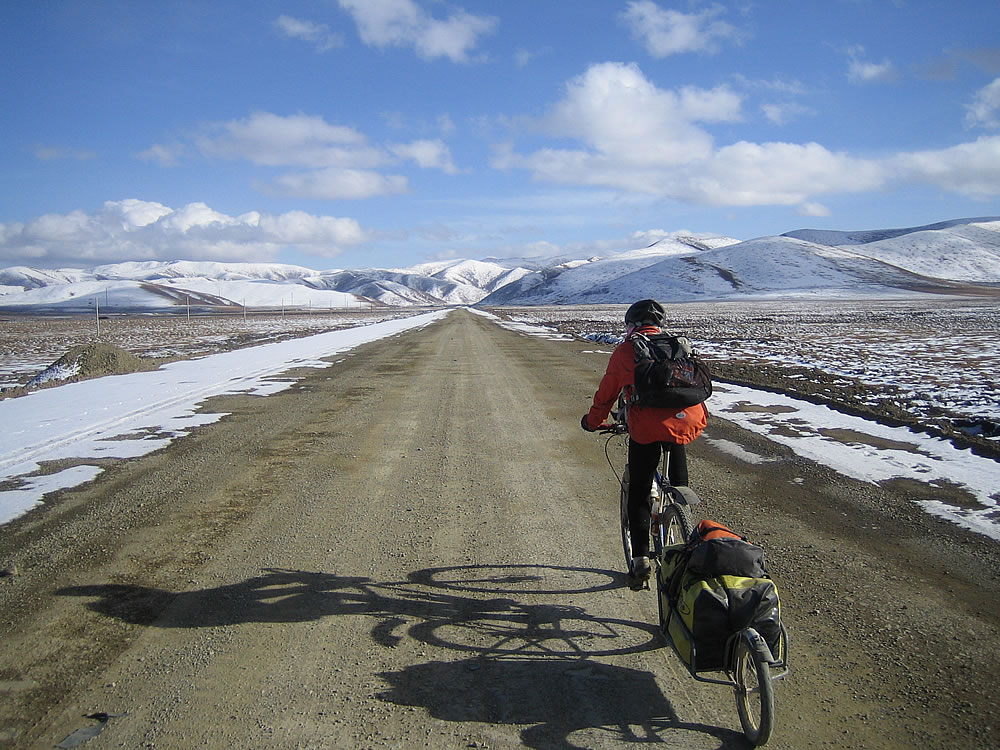
The Tibetan monastary town of Xiahe is a highlight. Although only sixteen of the original eighty temples remain after the depradations of the Cultural Revolution, the town is still a lively mix of crimson-robed monks, colourful Tibetan pilgrims, and Hui and Chinese merchants. We linked up with some other travellers to do a tour of the monastary led by an English-speaking monk, finishing up in a large prayer hall. Some eight hundred monks sat chanting softly in the dimly lit room, hundreds of yak butter candles flickered in the gloom, and we watched mesmerised as a line of pilgrims filed past, muttering prayers, ladling butter onto the candles and prostrating themselves. It was quite surreal – a brief visit to another world.
Lingering outside we watched dozens of monks spill out from a side door. In lines and little clusters they squatted to the ground. Meditation? outdoor prayers? As they rose one by one and returned to the hall we realised there was nothing theological about it – just a pee break using their long robes for privacy.
The temples are dazzling, with lurid paintings, swathes of bright fabric hanging everywhere and enormous and incredibly elaborate Buddhas and shrines. Thousand of sacred texts stored in glass cases line the walls, and the wooden floors and steps are worn smooth with the passage of countless feet. Everything is clean and polished and our monk guide says that initiates who fail their exams do the cleaning.
A fairly cold and difficult environment but probably the highlight of our trip was riding across the edge of the Tibetan plateau. This shot shows the high plains interspersed with lung busting climbs through mountain passes. We were riding at altitudes of over 3500 metres with our maximum altitude reaching about 4800 metres.
As we head off again the temperature takes a dive. The road has been ripped up in preparation for upgrading, and with a carpet of snow and ice it makes for slow and slippery going. Mud thrown up on the bikes freezes; to change gears on the front we have to bash the derailleur to break away the ice and free up the mechanism. Ed’s bottom bracket features an impressive array of icicles and our BOB bags freeze onto the trailers. Riding into the town of Hezuo, my trailer wheel jams solid with accumulated ice between tyre and mudguard …. sending me slithering along the icy main street on my bum, still attached to the bike, much to the amusement of the locals.
We holed up for a day, hoping the snow would stop and things defrost a bit. Little did we know that this was the start of a week where, despite the sun’s best efforts, the temperature would stay firmly stuck well below zero.
While in town we bumped into Patrick and Betty. As Patrick had an ironing board under his arm we quickly realised that these two were not your average backpackers passing through. Both worked as volunteer English teachers, with Chinese and Tibetan students. We had a great evening meeting some of their students at a club featuring Tibetan singers. Betty’s two year stint is nearly up and she was a fountain of information, able to fill us in on many of our burning questions about China and the Chinese.
The next few days were tough ones – long climbs, slow, tentative descents on ice-encrusted roads, Chinese-style mega roadworks reducing the road to a trail of mud, ice and rubble; and then, as we reached the high plateau, the effects of cycling at an altitude of 4000 metres. Although it was hard going the scenery was stunning with mountains and grasslands draped in white.
At one point we passed a group of Tibetan women washing a freshly slaughtered hide in a creek, with an audience of two dozen huge vultures watching intently. Later we stopped to photograph a family group astride massive bullocks, the women gorgeous with their long braids of jet black hair, heavy turquoise jewelery and long cloaks edged with fur and colourful braiding.
Finally we virtually plummeted off the edge of the plateau, suddenly descending steeply into a narrow gorge. This opened up into a river valley dotted with villages of ornate wooden houses. Soon we reached the sealed road and flew into Songpan, our time in the Tibetan world at an end.
A couple of days later we arrived in the bustling city of Chengdu, looking forward to a visit to the Giant Panda Research and Breeding Base. The pandas could be seen close up, and, as we watched them lounging indolently on their backs, methodically stuffing pawfuls of food into their mouths, it occurred to us that this was not unlike our own behaviour on rest days.
Continuing south we reached Mt. Emei, the highest of China’s four sacred mountains. We took a couple of days to scale the mountain, climbing thousands of steep, narrow, wet and icy rock steps and staying in the Buddhist monastaries located along the route. Walking sticks proved useful to deter the big monkeys keen to collect their dues from passing walkers …. they certainly don’t like to take no for an answer, and we saw one jump onto a hiker’s backpack and proceed to empty the exterior pockets searching for food.
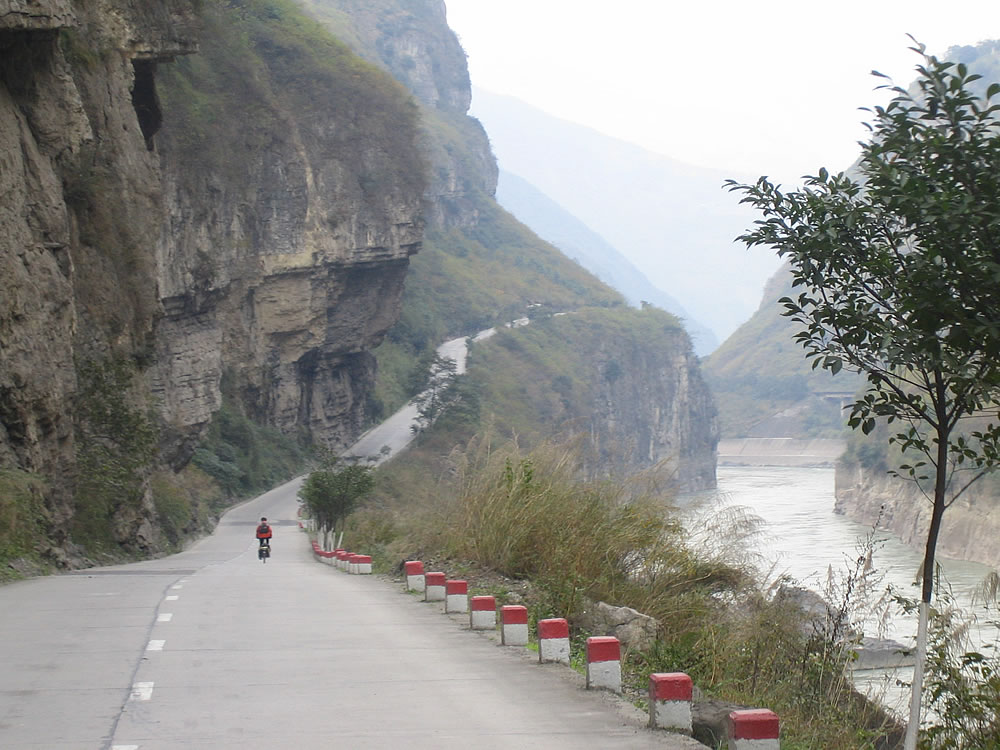
After Mt. Emei we thought perhaps the worst of the cold and mountains were now behind us. This was until we were stopped by police just 4km from our destination that day. They tried to get us to turn around and return to a town 25km back, but we refused to budge until we knew what was going on, thinking maybe they’d give up and let us through. After a while several more police cars arrived, spilling officials everywhere. With them were two men in civvies, one a very nervous English speaker, obviously dragged along to translate for the dumb foreigners. One of the men held up a sign – “Aliens are not permitted in this area without a permit”. I wanted to point out that we are travelling by bike, not flying saucer, but, judging from the reaction of many Chinese, we might well be from Mars. Looking around as the officials painstakingly note down our details, I realise that there are four police cars, twelve policemen, two civilians and a couple of interested passers-by, just to fend off two tourists in danger of straying into a “closed area”.
Backtracking is a pain, and that’s before we discover the alternative route involves a 100km climb winding up a narrow gorge. We overnight in a tiny village, where locals manage to communicate that the track ahead is virtually impassable because of knee-deep mud and snow. Given a choice of pushing on or having to take a bus back almost as far as Chengdu to pick up the main road south, we elect to forge on over the “impassable” pass.
The next day will go down in history as the most diabolical conditions we’ve ever encountered on any ride, ever. There were certainly plenty of knee-deep mud ruts, but it was the steep sections of frozen mud that led to us taking nearly seven hours to cover 30km. For kilometres we were inching our way up, trying to plant feet securely on the steep slippery surface, and then drag bike and trailer up half a metre at a time. It was hard to stop the bike sliding back down again as the layer of ice on the discs meant the brakes weren’t working too well.
Finally we hauled ourselves over the pass and within a couple of kilometres were able to get back on the bikes and scoot off downhill on a packed gravel surface. We are now gradually fighting our way out of the labyrinth of frozen mountains that we seem to have been trapped in since the police foiled our planned route.
At the moment it is hard to see the light at the end of what has been a very long, cold tunnel, but soon, soon we will basking on a beach in the sun and this will all seem like a bad dream. So, we will push on towards Laos, not expecting to cross the border now until the New Year. We wish you all a very “Merry Christmas”, and a safe and happy New Year, where ever you might be.
Heaven on a Bike
The chill of China is fast becoming a distant memory as we bask in the balmy tropical delights of Laos. Our journey has definitely been characterised by abrupt changes of temperature….. from snow in Switzerland to swimming in the Mediterranean; and from desperately seeking shade in culverts under the road in Iran, to cycling bundled up like a mummy in China.
The current switch to tropical conditions should see us all the way to Darwin, gradually getting colder as we get closer to home.
Crossing from Sichuan into Yunnan Province we were hopeful that road conditions would soon improve…..our hopes crumble as we hit a long section of rough, uneven cobblestone-style track. After a painful five hours we bounce into a small village and stop for a drink. We’ve both seen what looks like a strip of bitumen up ahead, but don’t want to mention it in case it’s too good to be true. The road really is sealed though and our speed reaches new heights as the mountains open up into a wide flat valley.
The next night we stopped off at a roadside ‘hotel’ – basically one long building divided into tiny concrete rooms, each with a rough plank ‘bed’ and little else. The family here were lovely, especially the Grandmother, a tiny stooped figure with piercing eyes who couldn’t seem to drag herself away from our door where she stood and watched intently as we moved our bikes and gear inside.
It’s ‘Murphy’s Law’ that whenever one of us gets crook with the squiggles, it’s never when we’re staying in a nice room with a functioning Western loo within easy reach. Nope ….. inevitably it always involves numerous nocturnal dashes outside in one’s undies, armed with a headtorch and trailing a roll of loo paper ….. and thus it was on this particular occasion.
The next day we managed a long haul into the backpacker oasis of Dali. Hard work, but worth it to spend a week off celebrating my fortieth birthday and Christmas surrounded by all the Western treats that we’d fantasised about for months. Yes, it was a paradise of bacon and eggs, chocolate cake and ice cream, pizza and hamburgers. After months of speaking English only to each other, all of a sudden there were Westerners everywhere. A week of this was enough though and we set off again on Boxing Day feeling refreshed and ready for whatever lay ahead.
As we make our way south the scenery changes, becoming progressively more lush and tropical. Clumps of Tasmanian blue gum trees are oddly mixed with banana trees. Vivid green terraced plots cascade down the mountainsides. Huge water buffalo plod passively along led by petite elderly women.
At Jinghong we reach the Mekong River …..it’s a special moment as the Mekong seems to symbolise South East Asia and the beginning of the next stage of our journey.
After three months we are both sad to be leaving China and pleased to be moving on to something new. China has been fascinating, challenging and downright frustrating. I’d describe it as something of an ‘auditory assault course’, with people pretty much incapable of doing anything quietly. The Chinese seem to be like a billion bower birds – all scrambling to get their hands on the brightest, most colourful, shiniest baubles. Fashion highlights spotted include a tutu worn with knee high boots and a guy matching his ruffled shirt with a kilt.
While the Chinese people have been a delight the same cannot be said for their government. Self-described as a ‘Democratic Dictatorship’ (?!) the continued Communist one party rule means that the freedoms we take for granted remain out of reach for the Chinese. We found the level of government control over what is taught and portrayed through the media quite extraordinary. The screening of a TV special celebrating the so-called ‘liberation’ of Tibet was enough to make us choke on our noodles.
We’ve often been amazed at the behaviour of the traffic in China. Huge gridlocks cause long backlogs of traffic, and it’s often just because the road is narrowed at some point and drivers can’t seem to bring themselves to give way. So you’ll have two vehicles stopped nose to nose, blasting their horns furiously. Traffic caught behind will be trying to squeeze past, thus creating further chaos, until eventually someone will come along and move whatever it was blocking the road in the first place.
When the main route passes through a village the road also serves as a sort of recreation area. Street vendors, taxis and motor-trikes spill across the road, men busily slaughter livestock, dogs prowl through scraps, kids play, people gossip and animals wander. When a bus or truck approaches at high speed, the driver leans on the horn and all scatter …… bicycles, buffalo, goats, dogs, piglets, chooks, toddlers, adults clutching their shopping. Debris goes flying in all directions, and then the dust settles and normal activity resumes.
China is the first country where our hotel rooms, no matter how grungy, have always included a TV. Despite the language barrier it is often fascinating stuff. A particular favourite was a competition, with a live audience, where forklift drivers competed to flick the caps off beer bottles using the forklift blade (points are deducted for any breakages!). The military ‘song and dance’ extravaganzas featuring uniformed performers on stage while jets thunder overhead and tanks roll past are possibly more of an acquired taste.
As we wind and climb through dense jungle towards the Laos border the early mornings are often very misty. One morning we encountered thick fog at the top of a pass; heading down we could barely see a few metres in front. The road was wet and slick with mud, and as Ed swerved to avoid a bunch of pigs running across the road his front wheel slid out from under him and he went down hard. He managed to get back on the bike and keep riding but by the day’s end was in considerable pain. When we reached Mengla the locals were confused by this tall, strong foreigner who’d arrived on a bike but was apparantly completely unable to walk. It took two people to shoulder Ed up to a room where he fell on the bed and didn’t move far for several days.
While we weren’t able to eat the actual pigs responsible for Ed’s fall, we did eat pork with extra relish for the next few days, figuring that we were almost certainly feasting on a close relative.
Although walking was still painful Ed was determined to ride on. My suggestion that he catch a bus to Luang Prabang to rest while I rode met with a stony silence and I awoke the next morning to find him dressed in riding gear and ready to go.
